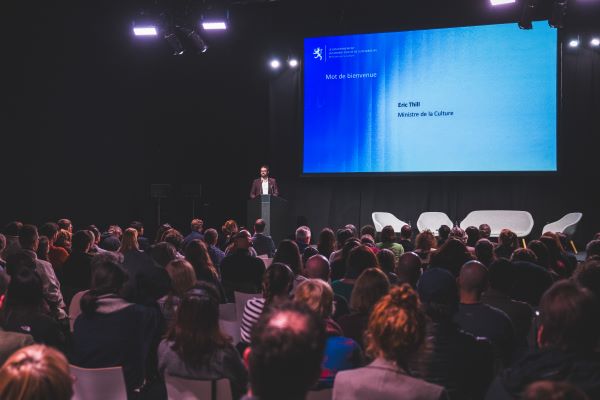 Eric Thill, Luxembourg’s Minister for Culture;
Credit: MCULT/standart
Eric Thill, Luxembourg’s Minister for Culture;
Credit: MCULT/standart
On Wednesday 12 November 2025, Luxembourg’s Ministry of Culture organised a thematic conference (“Assises thématiques”) dedicated to artificial intelligence (AI) and its impact on the cultural and creative industries at the 1535° Creative Hub in Differdange.
According to the ministry, the event brought together around 200 artists, creative entrepreneurs, institutions and associations. The discussions, moderated by Alessandra Luciano and Cédric Kayser from the Ministry of Culture, explored the transformative potential of AI and its impact on creation, protection and dissemination in the cultural sector.
In his opening speech, Luxembourg’s Minister for Culture, Eric Thill, stressed that “artificial intelligence is not science fiction but a reality already at work that questions our values, our authenticity and our relationship to creation.” He called for a responsible and participatory approach that places “dialogue, ethics and trust at the heart of cultural innovation.”
The minister presented the white paper “Culture et IA” (Culture and AI), now available on the Ministry of Culture’s website. The document provides an overview of AI’s impact on the cultural sector and will guide future discussions with stakeholders to shape a clear framework for its opportunities and challenges.
Minister Thill also announced the launch of the flagship project “Intelligent Heritage”, developed in partnership with the Luxembourg Centre for Contemporary and Digital History (C2DH) of the University of Luxembourg. This pilot project explores practical applications of AI aimed at enhancing cultural heritage while preserving rights, sensitivities and the diversity of sources. It is structured around four programmes: archives and collections; research and development; ethics; and the cultural mediation of digital arts.
A keynote speech by philosopher, art and image theorist, Dr Klaus Speidel, on the relationship between culture, art and AI was followed by two roundtable discussions focused on creation in the age of AI and the challenges of digital heritage. These discussions were further expanded in the afternoon through seven thematic workshops with participants exploring potential ideas and strategies to anticipate future developments in AI and to adopt new technologies responsibly and sustainably.
The Minister of Culture concluded the conference by emphasising: “AI raises technological but above all human and democratic questions. Culture, however, possesses what the machine will never have: empathy, memory, a free spirit and creativity. Let us seize this opportunity to keep humanity at the heart of the creative process and make technology a source of inspiration, not a replacement.”
EO









